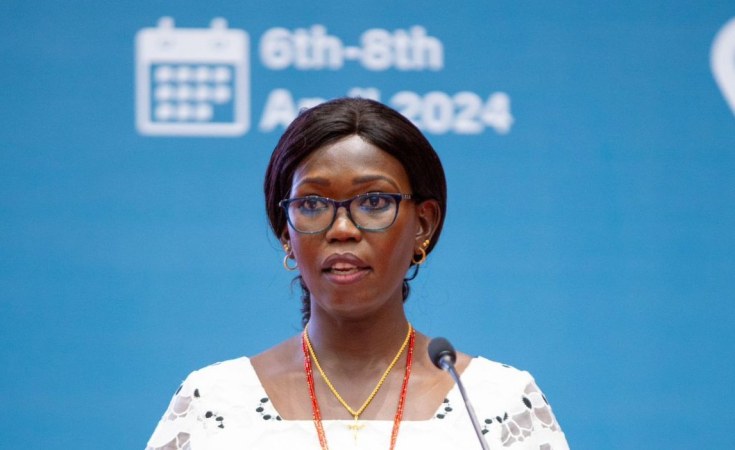Dar es Salaam, Tanzania — In South Sudan, young Keji* experienced a life of hardships and tragedies that ultimately led to her untimely death at the age of 20. Born in an informal settlement, Keji faced the loss of her mother at the tender age of 9. By the age of 10, she was raped. She had her first child when she was 14 years old. By 15, she was diagnosed with HIV, and at 19, she was diagnosed with cervical cancer.
Her life was a mere 20 years of struggle, leaving behind a daughter whose fate remains unknown.
Keji's story is not an isolated incident in South Sudan, but a representation of the countless women and girls facing similar challenges across Africa and beyond, often overlooked, said obstetrician and gynecologist Dr. Idyoro Ojukwu.
Dr. Ojukwu, the first female Obstetrician and Gynaecologist in South Sudan, narrated the story of Keji to provide context to the maternal deaths faced in the country as she addressed the WomenLift Health conference in Dar es Salaam, Tanzania.
The maternal mortality rate in South Sudan remains one of the highest in the world, with more than 1,150 deaths per 100,000 live births, according to the United Nations. Several factors contribute to this alarming rate, including infections, hemorrhaging, obstructed labor, and a low perception of childbirth risk among the population. Social norms that discourage women from seeking skilled birth attendants or antenatal care further compound the issue.
Dr. Ojukwu added that the maternal health crisis in South Sudan is a multifaceted issue, with women facing various challenges that can lead to fatal outcomes.
"Some women die on their way to health facilities during labor, while others die in health facilities due to inadequate care. The loss of unborn babies and the development of fistulas are also common outcomes for women who survive labor complications. In addition to the risks during childbirth, women in South Sudan also face challenges in accessing cancer treatment. For instance, cervical and breast cancer are leading causes of death among women, but there is a lack of available treatment facilities and screening programs in the country. Women often cannot afford to seek treatment outside of the country, leading to preventable deaths."
"The ratio of skilled healthcare personnel to the population is also inadequate, making it challenging to meet the healthcare needs of the population," she added.
The World Health Organization (WHO) has set a groundbreaking goal to eliminate this disease. This ambitious plan hinges on three key strategies with specific targets to be achieved by 2030. The first pillar focuses on prevention through widespread HPV vaccination, aiming to reach 90% of girls by age 15 to prevent future infections. Early detection is also critical, with the second strategy targeting 70% of women to undergo high-accuracy screening tests at specific ages. Finally, the third pillar emphasizes effective treatment, aiming to ensure that 90% of women with precancerous or invasive cervical cancer receive proper care. By achieving these ambitious "90-70-90" targets, countries can significantly reduce cervical cancer cases within the next century, saving countless lives.
The world aims to slash maternal deaths to under 70 per 100,000 births by 2030 (Sustainable Development Goal 3.1).
"South Sudan is nowhere near 10% to achieve this, and this is supposed to be achieved by 2030," said Dr. Ojukwu. "My country still doesn't have cervical cancer screening programs in place and no HPV vaccination for young girls."
In South Sudan, women and girls face a myriad of challenges, including the prevalence of rape without justice, clinic pregnancies, child marriages, and gender-based violence.
"Sexual violence is far too common, and justice for victims remains elusive, said Dr. Ojukwu.
South Sudan's health system requires significant investment
"Beyond this, harmful social norms create additional burdens. Clinic pregnancies and child marriages are prevalent, and access to contraception is severely limited. The misconception that contraception use signifies promiscuity discourages women from taking control of their reproductive health. As a consequence, women are expected to bear children until menopause, and safe termination options are nonexistent, often criminalized as abortions."
"In South Sudan, access to quality post-natal care is severely limited. This harsh reality struck me when I witnessed conditions in a hospital within my rural Eastern Equatoria state in Torit back in 2005. Back then, performing cesarean sections under only local anesthesia and ketamine was a common practice," she said.
"I'm sure as I speak here, many doctors in South Sudan are still doing the same."
"My call to action," she declared, "is for the world to wake up to the harsh reality in South Sudan. We must protect women and girls by ensuring their reproductive health rights. We need to champion their reproductive health rights - the very theme of this conference, 'Reimagining Leadership: New Approaches to New Challenges."
"South Sudan's health system requires significant investment. We need collaboration between the government, private sector, and NGOs to achieve sexual and reproductive health and rights for all."
"Let's advocate together, alongside GAVI and the South Sudanese government, to implement a national HPV vaccination program for our young girls. The power to achieve this change lies with all the women in this room. Together, we can make it happen. Now, more than ever, we need to push for change that empowers women to lead, thrive, and protect the vulnerable," she said.
*Not her real name


